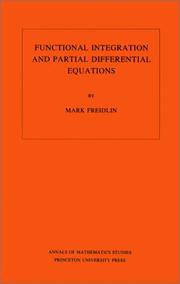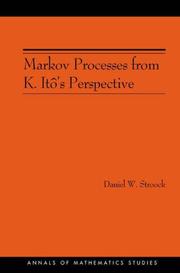| Listing 1 - 2 of 2 |
Sort by
|

ISBN: 0691083541 1400881595 Year: 1985 Publisher: Princeton, N.J.
Abstract | Keywords | Export | Availability | Bookmark
 Loading...
Loading...Choose an application
- Reference Manager
- EndNote
- RefWorks (Direct export to RefWorks)
This book discusses some aspects of the theory of partial differential equations from the viewpoint of probability theory. It is intended not only for specialists in partial differential equations or probability theory but also for specialists in asymptotic methods and in functional analysis. It is also of interest to physicists who use functional integrals in their research. The work contains results that have not previously appeared in book form, including research contributions of the author.
Partial differential equations --- Differential equations, Partial. --- Probabilities. --- Integration, Functional. --- Functional integration --- Functional analysis --- Integrals, Generalized --- Probability --- Statistical inference --- Combinations --- Mathematics --- Chance --- Least squares --- Mathematical statistics --- Risk --- A priori estimate. --- Absolute continuity. --- Almost surely. --- Analytic continuation. --- Axiom. --- Big O notation. --- Boundary (topology). --- Boundary value problem. --- Bounded function. --- Calculation. --- Cauchy problem. --- Central limit theorem. --- Characteristic function (probability theory). --- Chebyshev's inequality. --- Coefficient. --- Comparison theorem. --- Continuous function (set theory). --- Continuous function. --- Convergence of random variables. --- Cylinder set. --- Degeneracy (mathematics). --- Derivative. --- Differential equation. --- Differential operator. --- Diffusion equation. --- Diffusion process. --- Dimension (vector space). --- Direct method in the calculus of variations. --- Dirichlet boundary condition. --- Dirichlet problem. --- Eigenfunction. --- Eigenvalues and eigenvectors. --- Elliptic operator. --- Elliptic partial differential equation. --- Equation. --- Existence theorem. --- Exponential function. --- Feynman–Kac formula. --- Fokker–Planck equation. --- Function space. --- Functional analysis. --- Fundamental solution. --- Gaussian measure. --- Girsanov theorem. --- Hessian matrix. --- Hölder condition. --- Independence (probability theory). --- Integral curve. --- Integral equation. --- Invariant measure. --- Iterated logarithm. --- Itô's lemma. --- Joint probability distribution. --- Laplace operator. --- Laplace's equation. --- Lebesgue measure. --- Limit (mathematics). --- Limit cycle. --- Limit point. --- Linear differential equation. --- Linear map. --- Lipschitz continuity. --- Markov chain. --- Markov process. --- Markov property. --- Maximum principle. --- Mean value theorem. --- Measure (mathematics). --- Modulus of continuity. --- Moment (mathematics). --- Monotonic function. --- Navier–Stokes equations. --- Nonlinear system. --- Ordinary differential equation. --- Parameter. --- Partial differential equation. --- Periodic function. --- Poisson kernel. --- Probabilistic method. --- Probability space. --- Probability theory. --- Probability. --- Random function. --- Regularization (mathematics). --- Schrödinger equation. --- Self-adjoint operator. --- Sign (mathematics). --- Simultaneous equations. --- Smoothness. --- State-space representation. --- Stochastic calculus. --- Stochastic differential equation. --- Stochastic. --- Support (mathematics). --- Theorem. --- Theory. --- Uniqueness theorem. --- Variable (mathematics). --- Weak convergence (Hilbert space). --- Wiener process.

ISBN: 0691115427 1400835577 0691115435 1322063230 9781400835577 9781322063232 9780691115436 9870691115427 9780691115429 Year: 2003 Publisher: Princeton Princeton University Press
Abstract | Keywords | Export | Availability | Bookmark
 Loading...
Loading...Choose an application
- Reference Manager
- EndNote
- RefWorks (Direct export to RefWorks)
Kiyosi Itô's greatest contribution to probability theory may be his introduction of stochastic differential equations to explain the Kolmogorov-Feller theory of Markov processes. Starting with the geometric ideas that guided him, this book gives an account of Itô's program. The modern theory of Markov processes was initiated by A. N. Kolmogorov. However, Kolmogorov's approach was too analytic to reveal the probabilistic foundations on which it rests. In particular, it hides the central role played by the simplest Markov processes: those with independent, identically distributed increments. To remedy this defect, Itô interpreted Kolmogorov's famous forward equation as an equation that describes the integral curve of a vector field on the space of probability measures. Thus, in order to show how Itô's thinking leads to his theory of stochastic integral equations, Stroock begins with an account of integral curves on the space of probability measures and then arrives at stochastic integral equations when he moves to a pathspace setting. In the first half of the book, everything is done in the context of general independent increment processes and without explicit use of Itô's stochastic integral calculus. In the second half, the author provides a systematic development of Itô's theory of stochastic integration: first for Brownian motion and then for continuous martingales. The final chapter presents Stratonovich's variation on Itô's theme and ends with an application to the characterization of the paths on which a diffusion is supported. The book should be accessible to readers who have mastered the essentials of modern probability theory and should provide such readers with a reasonably thorough introduction to continuous-time, stochastic processes.
Markov processes. --- Stochastic difference equations. --- Itō, Kiyosi, --- Analysis, Markov --- Chains, Markov --- Markoff processes --- Markov analysis --- Markov chains --- Markov models --- Models, Markov --- Processes, Markov --- Itō, K. --- Ito, Kiesi, --- Itō, Kiyoshi, --- 伊藤淸, --- 伊藤清, --- Itō, Kiyosi, --- Itō, Kiyosi, 1915-2008. --- Stochastic difference equations --- Difference equations --- Stochastic processes --- Abelian group. --- Addition. --- Analytic function. --- Approximation. --- Bernhard Riemann. --- Bounded variation. --- Brownian motion. --- Central limit theorem. --- Change of variables. --- Coefficient. --- Complete metric space. --- Compound Poisson process. --- Continuous function (set theory). --- Continuous function. --- Convergence of measures. --- Convex function. --- Coordinate system. --- Corollary. --- David Hilbert. --- Decomposition theorem. --- Degeneracy (mathematics). --- Derivative. --- Diffeomorphism. --- Differentiable function. --- Differentiable manifold. --- Differential equation. --- Differential geometry. --- Dimension. --- Directional derivative. --- Doob–Meyer decomposition theorem. --- Duality principle. --- Elliptic operator. --- Equation. --- Euclidean space. --- Existential quantification. --- Fourier transform. --- Function space. --- Functional analysis. --- Fundamental solution. --- Fundamental theorem of calculus. --- Homeomorphism. --- Hölder's inequality. --- Initial condition. --- Integral curve. --- Integral equation. --- Integration by parts. --- Invariant measure. --- Itô calculus. --- Itô's lemma. --- Joint probability distribution. --- Lebesgue measure. --- Linear interpolation. --- Lipschitz continuity. --- Local martingale. --- Logarithm. --- Markov chain. --- Markov process. --- Markov property. --- Martingale (probability theory). --- Normal distribution. --- Ordinary differential equation. --- Ornstein–Uhlenbeck process. --- Polynomial. --- Principal part. --- Probability measure. --- Probability space. --- Probability theory. --- Pseudo-differential operator. --- Radon–Nikodym theorem. --- Representation theorem. --- Riemann integral. --- Riemann sum. --- Riemann–Stieltjes integral. --- Scientific notation. --- Semimartingale. --- Sign (mathematics). --- Special case. --- Spectral sequence. --- Spectral theory. --- State space. --- State-space representation. --- Step function. --- Stochastic calculus. --- Stochastic. --- Stratonovich integral. --- Submanifold. --- Support (mathematics). --- Tangent space. --- Tangent vector. --- Taylor's theorem. --- Theorem. --- Theory. --- Topological space. --- Topology. --- Translational symmetry. --- Uniform convergence. --- Variable (mathematics). --- Vector field. --- Weak convergence (Hilbert space). --- Weak topology.
| Listing 1 - 2 of 2 |
Sort by
|

 Search
Search Feedback
Feedback About UniCat
About UniCat  Help
Help News
News